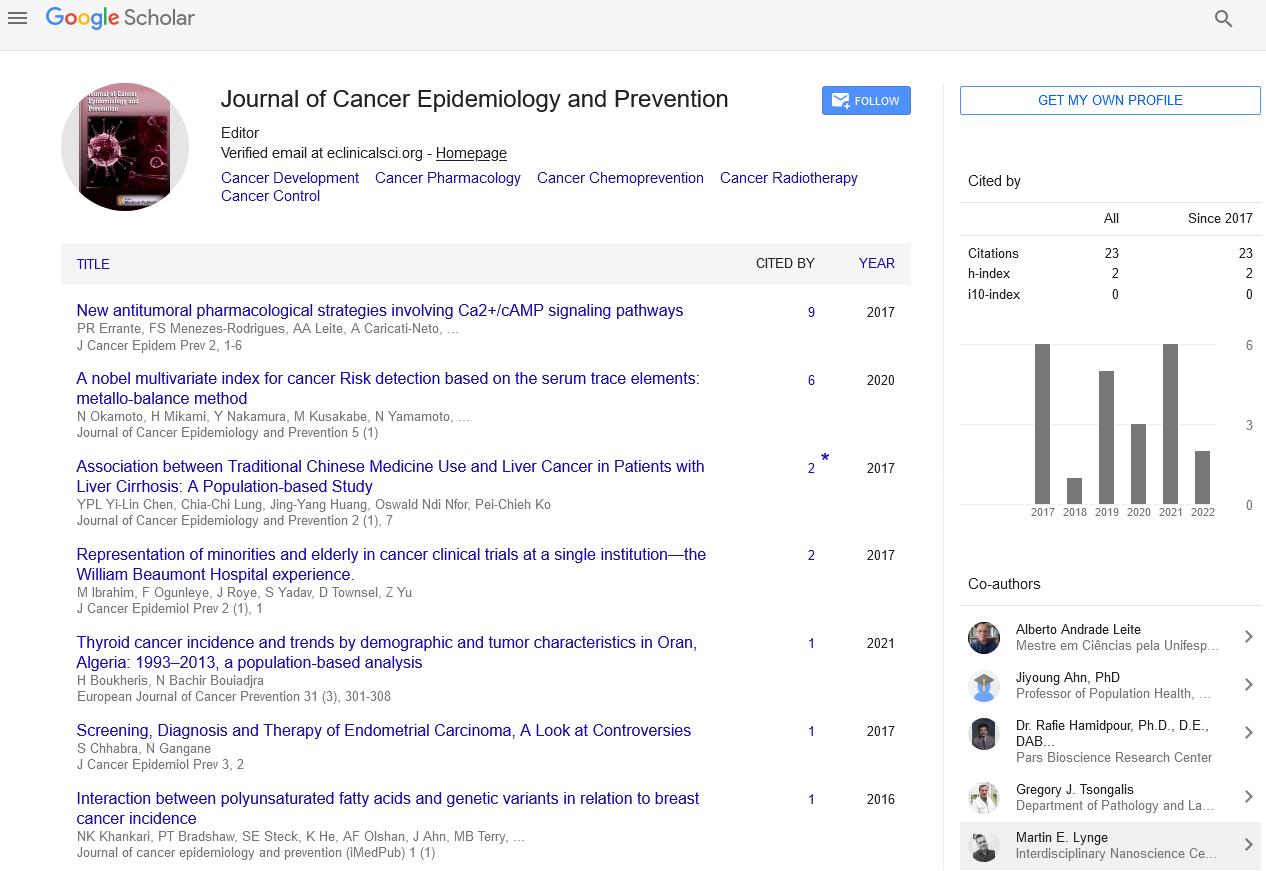Short Communication - (2025) Volume 10, Issue 1
Navigating the Side Effects of Chemotherapy: Understanding and Managing the Journey to Healing
Bhuchi Nwapa*
Department of Gastroenterologist, University of Lagos, Nigeria
*Correspondence:
Bhuchi Nwapa, Department of Gastroenterologist, University of Lagos,
Nigeria,
Email:
Received: 19-Mar-2024, Manuscript No. IPJCEP-24-19248;
Editor assigned: 21-Mar-2024, Pre QC No. IPJCEP-24-19248 (PQ);
Reviewed: 04-Apr-2024, QC No. IPJCEP-24-19248;
Revised: 24-Mar-2025, Manuscript No. IPJCEP-24-19248 (R);
Published:
01-Apr-2025, DOI: 10.36648/ipjcep.10.1.40
Introduction
Chemotherapy, a cornerstone of cancer treatment, employs
powerful drugs to destroy rapidly dividing cancer cells. While
chemotherapy can be highly effective in combating cancer, it
often comes with a range of side effects that can impact a
patient's quality of life. In this article, we'll explore the
common side effects of chemotherapy, strategies for
managing them, and the importance of support during this
challenging journey.
Description
Understanding common side effects:
Nausea and vomiting: Chemotherapy drugs can irritate the stomach lining, triggering nausea and vomiting. These symptoms may occur shortly after treatment or persist for days.
Fatigue: Feelings of extreme tiredness and weakness are common side effects of chemotherapy, often attributed to the body's response to treatment and the depletion of healthy cells.
Hair loss: Many chemotherapy drugs target rapidly dividing cells, including those in hair follicles, leading to partial or complete hair loss on the scalp and other parts of the body.
Loss of appetite: Chemotherapy can affect taste buds and cause changes in appetite, leading to decreased food intake and potential weight loss.
Immune suppression: Chemotherapy can weaken the immune system, increasing the risk of infections and delaying the body's ability to recover from illness.
Mouth sores and mucositis: Chemotherapy-induced damage to the mucous membranes can result in painful mouth sores, difficulty swallowing, and oral infections.
Neuropathy: Some chemotherapy drugs can cause nerve damage, leading to tingling, numbness, or weakness in the hands and feet.
Cognitive changes: Often referred to as "chemo brain," chemotherapy may cause difficulties with concentration, memory, and cognitive function.
Managing side effects
Anti-nausea medications: Prescription medications and antinausea drugs can help alleviate nausea and vomiting associated with chemotherapy.
Supportive care: Adequate rest, hydration, and nutrition are essential for managing fatigue and promoting overall wellbeing during chemotherapy treatment.
Cold cap therapy: Cooling caps or scalp cooling systems may help minimize hair loss by reducing blood flow to the scalp during chemotherapy infusion.
Supportive therapies: Acupuncture, massage therapy, and relaxation techniques can provide relief from chemotherapyinduced symptoms and improve overall comfort.
Oral care: Maintaining good oral hygiene and using gentle mouthwashes can help prevent and alleviate mouth sores and mucositis.
Exercise and physical therapy: Regular exercise and physical activity can combat fatigue, improve strength and endurance, and enhance overall quality of life during chemotherapy treatment.
Nutritional support: Working with a registered dietitian to develop a balanced diet and incorporating nutrient-rich foods can help combat appetite changes and support optimal nutrition.
Psychological support: Counseling, support groups, and mental health services can provide emotional support and coping strategies for managing the emotional toll of chemotherapy treatment.
Conclusion
While the side effects of chemotherapy can be challenging to endure, it's essential to remember that they are often temporary and manageable with the right support and interventions. Open communication with healthcare providers, adherence to prescribed medications and therapies, and a strong support network can make a significant difference in navigating the side effects of chemotherapy and achieving the best possible outcomes.
Above all, remember that you are not alone on this journey. Lean on your loved ones, healthcare team, and support networks for guidance, encouragement, and understanding as you navigate the road to healing and recovery.
Stay strong, stay resilient, and keep moving forward one day at a time.
Citation: Nwapa B (2025) Navigating the Side Effects of Chemotherapy: Understanding and Managing the Journey to Healing. Am
J Cancer Epidemiol Prev. 10:40.
Copyright: © 2025 Nwapa B. This is an open-access article distributed under the terms of the Creative Commons Attribution
License, which permits unrestricted use, distribution, and reproduction in any medium, provided the original author and source
are credited.

